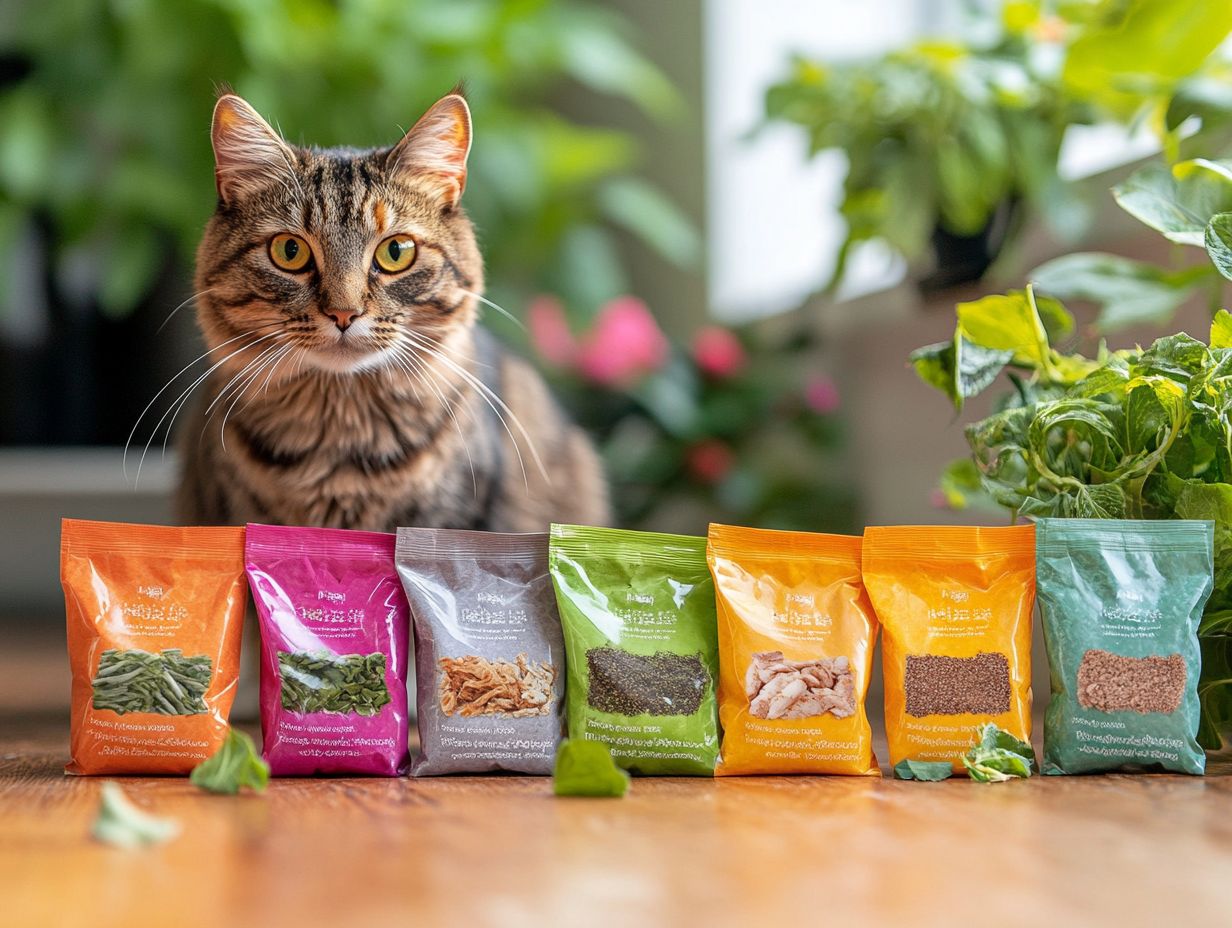If your feline friend struggles with a sensitive stomach, finding the right food can make all the difference. Recent studies suggest that the choice of diet plays a critical role in managing digestive health.
The right organic cat food not only meets their nutritional needs but also eases digestive discomfort. It’s important to note that hypoallergenic diets should be used under veterinary supervision, and not all organic foods are hypoallergenic. Always consult with a veterinarian to ensure recommendations align with AAFCO and WSAVA guidelines.
We explore the top organic cat foods specifically designed for sensitive stomachs, featuring recipes that prioritize high-quality, animal-source proteins and natural goodness, such as those offered by brands like Royal Canin, Halo, and Koha. However, any dietary changes should be discussed with a veterinarian, especially for cats with known health issues.
Additionally, we share helpful tips on managing your cat’s digestive health, including the importance of a feeding routine, incorporating prebiotics, and practical feeding advice like portion control and gradual diet transitions to prevent gastrointestinal upset.
Key Takeaways:
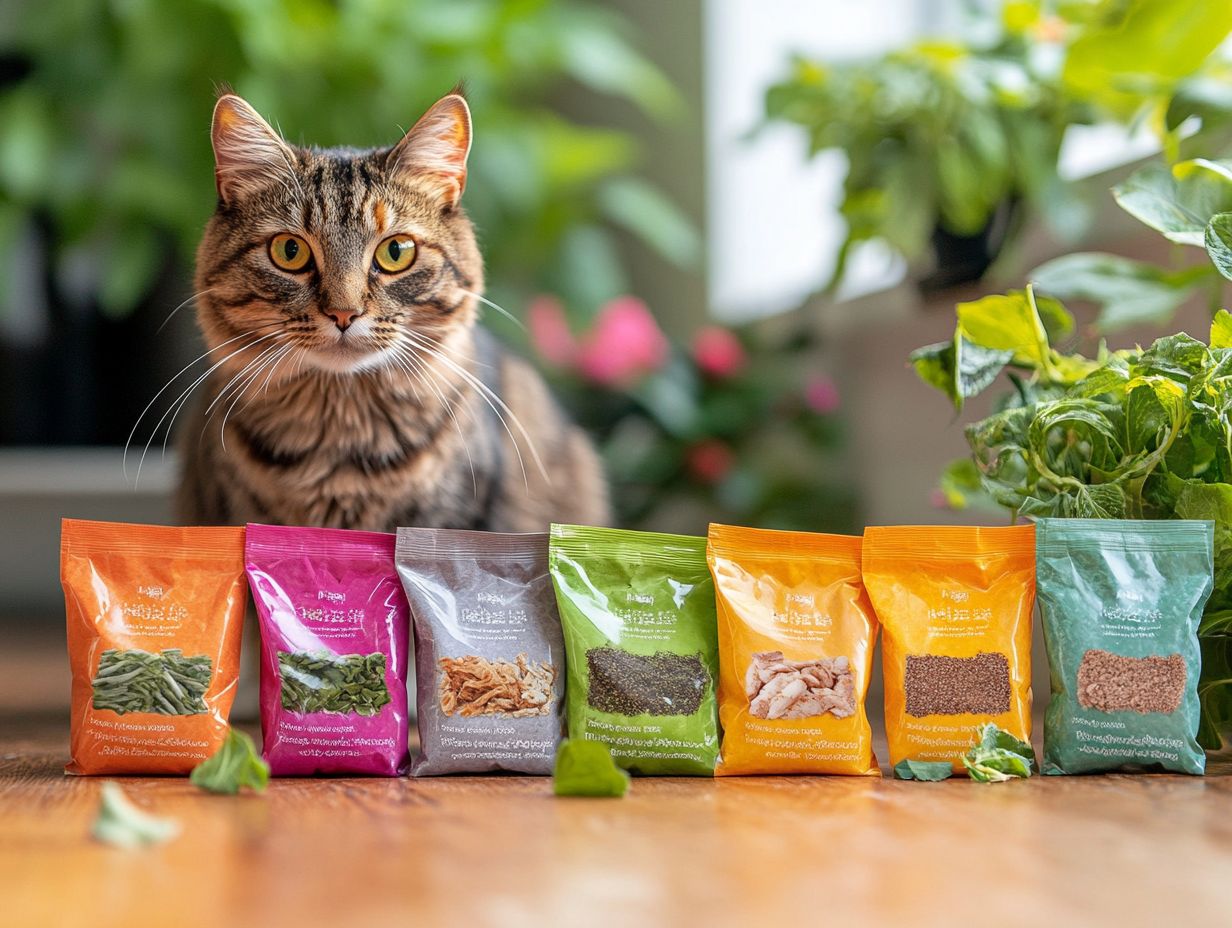
Top Organic Cat Foods for Sensitive Stomachs
The best organic cat food for sensitive stomachs is designed to meet your cat’s specific nutritional needs. Gastrointestinal issues are common in many cats and may manifest as GI disturbances, food intolerances, or food allergies. Common allergens include certain proteins, grains, and dairy, which can lead to symptoms such as vomiting, diarrhea, and itching.
Therefore, cat owners should look for highly digestible and limited-ingredient diets, as these types of food promote easy digestion and create a healthy gut environment filled with beneficial bacteria. This can be particularly helpful for cats experiencing stress-related problems. It’s essential to ensure that any homemade or specialized diet meets AAFCO standards to avoid deficiencies or imbalances.
1. Blue Buffalo Wilderness Grain-Free Indoor Chicken Recipe
The Blue Buffalo Wilderness Grain-Free Indoor Chicken Recipe is an excellent choice for cats with sensitive stomachs, featuring a highly digestible formula with real chicken as the first protein source. This recipe includes healthy ingredients like peas and potatoes, which provide essential vitamins and minerals while remaining grain-free to align with a cat’s natural dietary needs.
Additionally, it contains probiotics that support digestive health and can help reduce common issues such as hairballs and gastrointestinal disturbances. By prioritizing nutritious ingredients and achieving a balanced nutrition profile, this food option addresses the specific dietary needs of indoor cats, ensuring they maintain their energy levels despite their indoor lifestyles.
2. Instinct Limited Ingredient Diet Grain-Free Real Rabbit Recipe
The Instinct Limited Ingredient Diet Grain-Free Real Rabbit Recipe is a specialized formula designed for cats with food sensitivities. It features rabbit as the primary protein source and employs a limited ingredient diet to minimize the likelihood of potential allergens.
This formulation is particularly beneficial for cats with stomach sensitivities and those with known food allergies, as it avoids many irritants commonly found in traditional diets. Easily digestible fibers promote digestion and foster a healthy gut environment, allowing for better nutrient absorption.
Additionally, healthy fats support an overall healthy coat and provide a rich source of energy. This specialized approach offers peace of mind to pet owners and contributes to a happier, healthier life for their feline companions.
3. Wellness Simple Limited Ingredient Diet Grain-Free Salmon & Potato Recipe
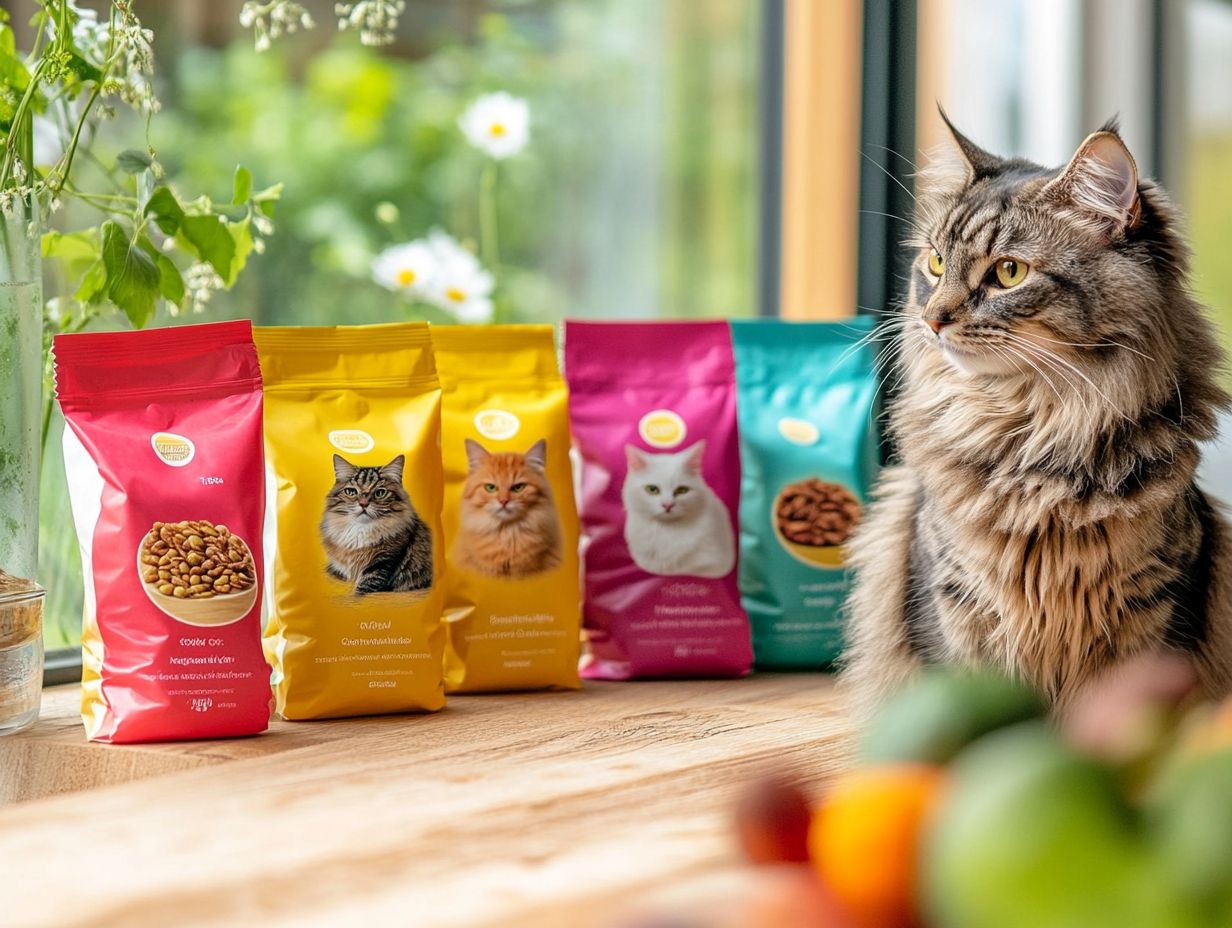
Wellness Simple Limited Ingredient Diet Grain-Free Salmon & Potato Recipe harnesses the rich flavor of salmon along with easily digestible potatoes, making it an excellent choice for cats with sensitive stomachs.
Before starting any new diet, it is crucial to consult with a veterinarian, especially for cats with specific health conditions like kidney disease or diabetes. Furthermore, this diet’s nutrient profile aligns well with the needs of cats managing these conditions.
Additionally, proper food storage and handling practices are important; keep organic cat food in a cool, dry place and ensure that opened packages are properly sealed to prevent spoilage and ensure food safety.
This thoughtfully crafted formula is formulated with limited ingredients, which is particularly beneficial for animals with food intolerances or adverse reactions to complex diets. By prioritizing easy digestion, it minimizes gastrointestinal discomfort and helps cats feel their best. For more information, check out Sensitive Stomach? Top Organic Cat Foods for Digestive Health. Please consult your veterinarian before switching diets, especially for cats with known food sensitivities or health issues.
The blend of essential vitamins and minerals supports overall health, ensuring that these cats receive proper nutrition without exposing them to common allergens such as grains or artificial additives. This approach not only enhances digestive comfort but also promotes overall well-being, allowing even the most sensitive cats to thrive. It’s important to monitor for signs of nutritional deficiencies that may arise from limited ingredient diets.
4. Natural Balance Limited Ingredient Diets Green Pea & Duck Recipe
The Natural Balance Limited Ingredient Diets Green Pea & Duck Recipe provides a unique protein source featuring duck and green peas, making it suitable for cats that may be prone to food allergies. This limited ingredient approach not only simplifies meal planning but also helps cat owners identify specific dietary factors that could contribute to gastrointestinal issues. While these diets aim to reduce allergy risks, they may not be suitable for all cats. Each cat’s needs can vary, and individual assessment is crucial.
By emphasizing easily digestible ingredients, this recipe promotes healthy digestion and aids in maintaining optimal weight, making it an excellent choice for those monitoring their cat’s eating habits. Furthermore, the formulation is free from artificial preservatives, ensuring that what goes into a cat’s bowl is both wholesome and nourishing, alleviating concerns about synthetic additives.
5. Newman’s Own Organics Grain-Free Chicken & Liver Recipe
Newman’s Own Organics Grain-Free Chicken & Liver Recipe combines high-quality chicken and liver, making it an excellent choice for cats with sensitive stomachs. This grain-free formula boasts a high protein content, which is essential for maintaining muscle health, energy levels, and overall well-being in cats.
The absence of grains reduces the likelihood of allergens, which can be particularly beneficial for cats prone to digestive issues. The specific ingredients included in this recipe promote overall digestion and ensure that cats can efficiently absorb nutrients.
For cats that tend to eat less when stressed, this nutrient-rich recipe offers a great option to help stabilize their moods and enhance their overall well-being.
Other Tips for Managing a Sensitive Stomach in Cats
Managing a cat with a sensitive stomach involves considering dietary factors, adjusting feeding schedules, and incorporating supplements like probiotics to support digestive health. It’s also wise to consult your veterinarian for best practices.
1. Feed Smaller, More Frequent Meals
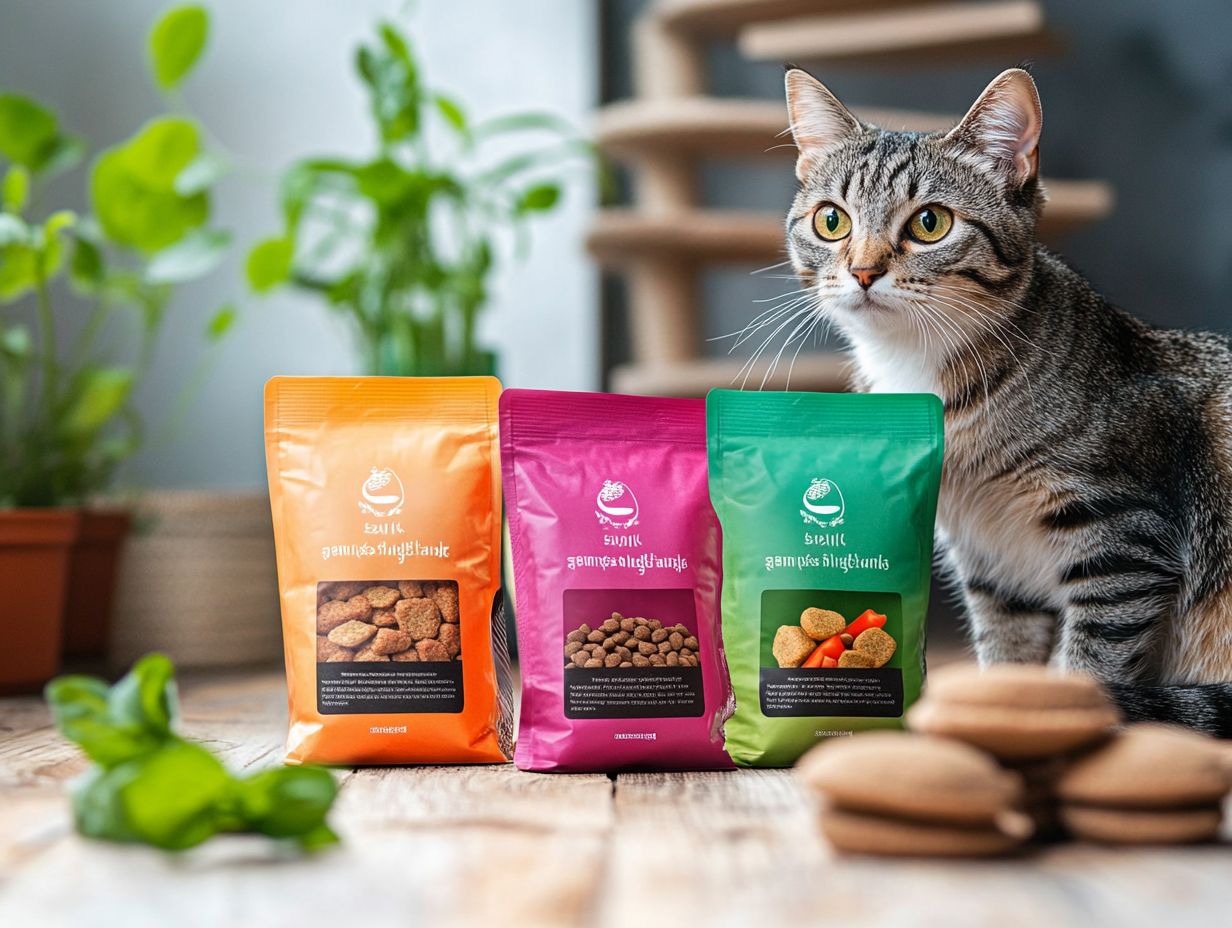
Feeding smaller, more frequent meals can greatly enhance digestive health for cats with sensitive stomachs, reducing the risk of gastrointestinal disturbances and minimizing stress during mealtimes. This approach facilitates better nutrient absorption, as the digestive system is not overwhelmed by large portions. For more information, check out Sensitive Stomach? Top Organic Cat Foods for Digestive Health.
For cats experiencing food intolerances or stress-related eating issues, smaller meals offer a gentle and manageable way to introduce new foods or eliminate problematic ingredients. Additionally, this method aids in weight management by preventing overeating, promotes a healthy metabolism, and contributes to an overall sense of well-being. Maintaining a consistent feeding schedule can also provide a sense of security, fostering a more relaxed eating environment.
2. Monitor Your Cat’s Water Intake
Monitoring a cat’s water intake is essential for ensuring proper hydration, particularly in those with sensitive stomachs, as it is closely linked to their digestive health. Adequate hydration can help minimize gastrointestinal issues, especially in cats with food sensitivities or those transitioning to new diets. The ideal daily water intake for cats is approximately 3.5 to 4.5 ounces per 5 pounds of body weight.
Water plays a vital role in aiding digestion by dissolving food and facilitating the rapid transport of nutrients throughout the body. To enhance water intake, consider placing multiple water bowls in different rooms or investing in a pet water fountain, which many cats prefer over stagnant water. Additionally, incorporating wet food into their diet can significantly boost their hydration levels.
Additionally, incorporating canned or moisture-rich food into a cat’s diet provides both hydration and nutrition, making it easier for them to adjust to dietary changes while promoting healthy digestion. For more information, check out Sensitive Stomach? Top Organic Cat Foods for Digestive Health. Please note that the linked article may not reflect the latest veterinary guidelines, and we urge you to consult with a veterinarian for tailored advice.
3. Consider Probiotics for Gut Health
Probiotics support the cat’s digestive system by introducing beneficial bacteria and promoting the growth of healthy gut flora, which overall enhances digestion in cats. This is especially advantageous for cats with sensitive stomachs, as different probiotic strains can address various digestive issues. Their effectiveness can vary, so it’s essential to choose products specifically formulated for cats and consult a vet before starting any supplement.
For instance, options like Lactobacillus acidophilus and Bifidobacterium bifidum help create a balanced gut microbiota, alleviating discomfort often caused by stress or sudden dietary changes. Probiotics can help with digestive health but should not replace veterinary diagnosis or treatment for gastrointestinal issues, reducing gastrointestinal disturbances and leading to firmer stools while minimizing symptoms such as gas and bloating.
Regular use of probiotics helps maintain a balanced digestive system, addressing GI disturbances and ultimately improving your cat’s overall quality of life by meeting their nutritional requirements.
Frequently Asked Questions
What is a sensitive stomach and how do I know if my cat has one?
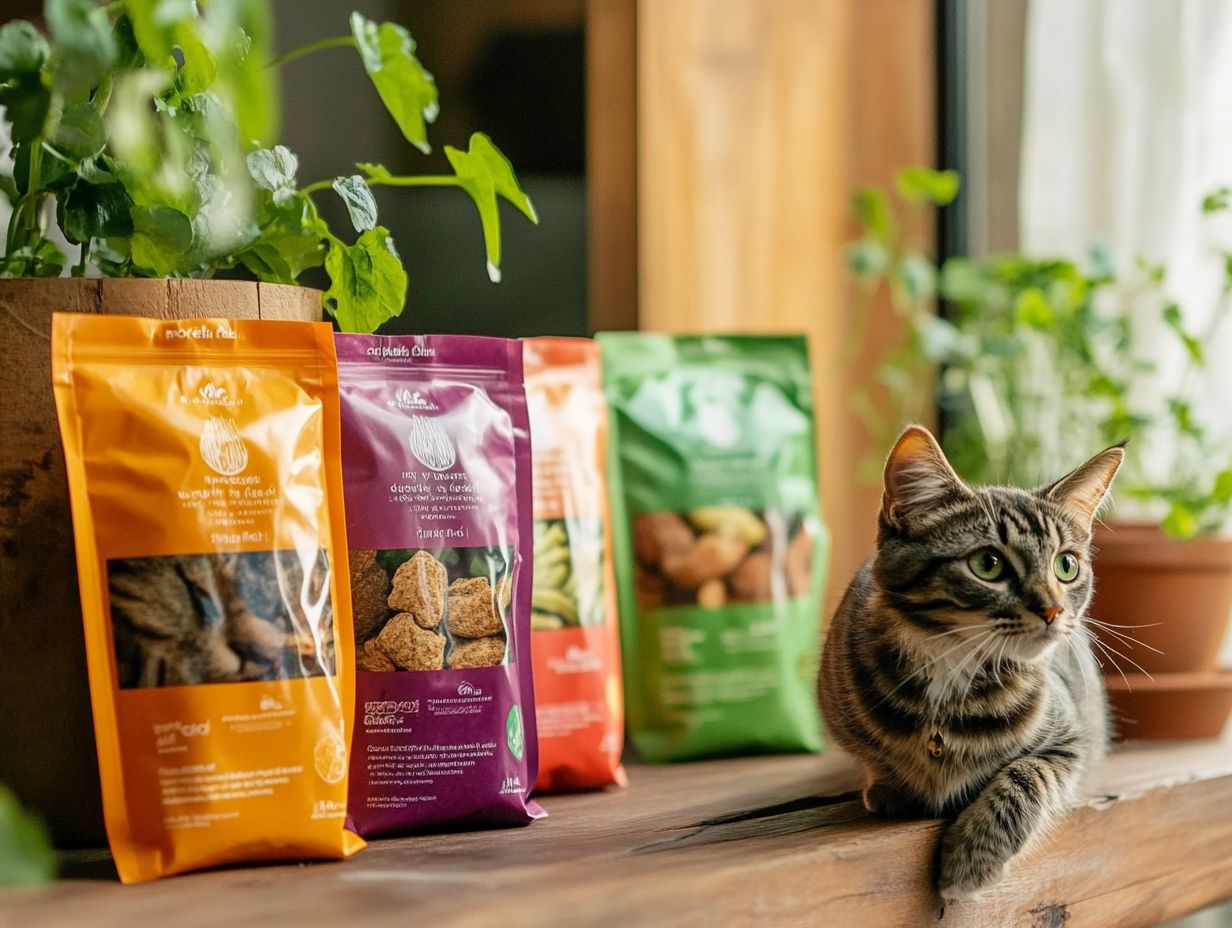
A sensitive stomach in cats refers to a digestive system that is easily upset or irritated by certain foods and can be a symptom of underlying health issues. Symptoms may include frequent vomiting, diarrhea, weight loss, and loss of appetite. If your cat experiences these symptoms regularly, diagnostic tests may be needed to determine if they have a sensitive stomach. We advise consulting a veterinarian for proper diagnosis and treatment.
Why should I choose an organic cat food for my cat with a sensitive stomach?
Organic cat food is made with high-quality, natural ingredients that are free from artificial fillers, additives, and food coloring. This can help reduce the risk of triggering digestive issues and support better stool quality in cats with sensitive stomachs. Ensure that any selected brands meet AAFCO guidelines for cat food.
What are some top organic cat food brands that are recommended for cats with sensitive stomachs?
Some top organic cat food brands for digestive health include Orijen, Wellness, Blue Buffalo, and Natural Balance. Brands like Purina also offer specialized formulas. These brands use high-quality, organic ingredients that are gentle on the digestive system and cater to various food preferences. Evidence supports the effectiveness of these brands for digestive health.
What ingredients should I look for in an organic cat food for sensitive stomachs?
When choosing an organic cat food for a sensitive stomach, look for limited ingredients and avoid common allergens such as grains, artificial preservatives, and by-products. Instead, prioritize high-quality animal-source proteins as primary ingredients, antioxidant vitamins, and easily digestible carbohydrates such as sweet potato or pumpkin.
How can I gradually transition my cat to a new organic diet without upsetting their sensitive stomach?
To avoid upsetting your cat’s stomach during a diet transition, it is important to do it gradually, typically over at least 7-10 days. Mix a small amount of the new organic food with their current food and gradually increase the ratio over the course of a few weeks until they are solely on the new organic diet. Sudden changes can lead to digestive upset.
Are there any other steps I can take to help improve my cat’s digestive health?
In addition to choosing an organic cat food, there are other steps you can take to improve your cat’s digestive health. This includes ensuring they have access to clean, fresh water at all times, feeding them small, frequent meals, and maintaining a consistent feeding schedule. Consider prescription diets for specific health issues or gastrointestinal problems. Proper food storage and handling practices are essential to prevent spoilage; be mindful of signs of spoilage, especially in homemade or raw diets. Additionally, monitor your cat’s food intake, avoid giving them table scraps or human food, and be aware of routine changes and behavior changes that may indicate stress reduction is needed.
